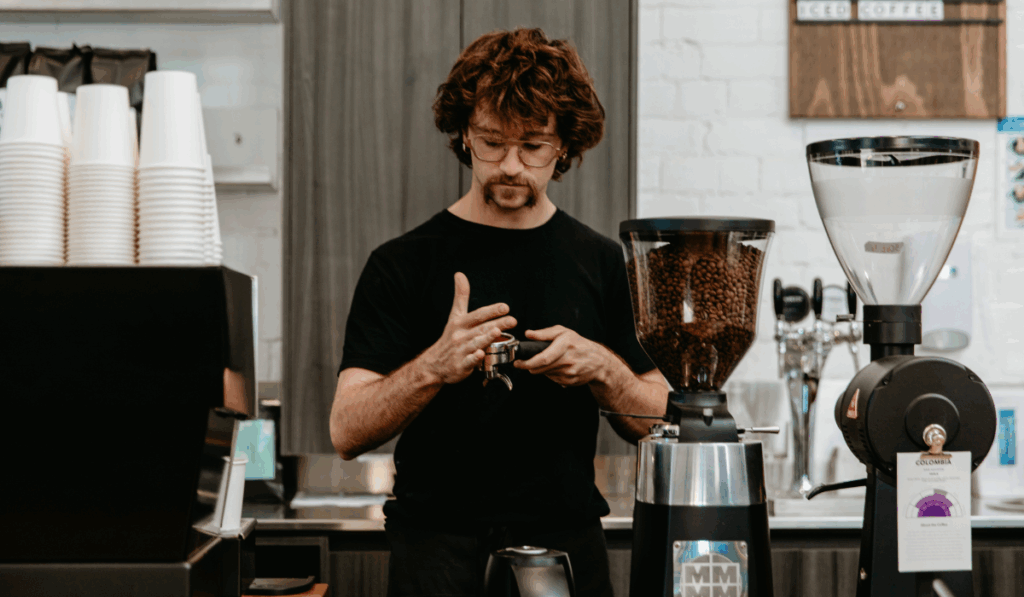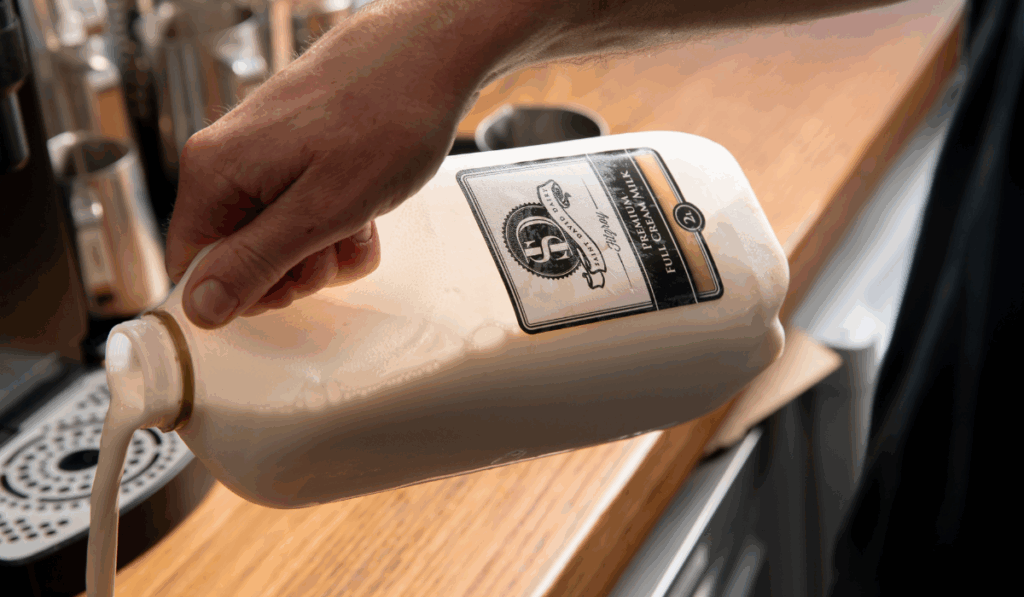From a frothy latte, to a dollop of fresh cream or a thick slathering of butter, ingredients rich in texture and flavour will tantalise the fussiest of tastebuds. Purchasing homemade products from a farmer’s market or local artisanal store guarantees an authentic taste experience.
Yet similar, mass-produced ingredients on supermarket shelves often taste surprisingly different. Butter, cream and milk that should be ‘rich, creamy and flavourful’ are often disappointingly replaced by products with a bland and watery consistency, but why?
The answer is multilayered, but ultimately it comes down to manufacturing. Due to consumer demands for products to maintain high standards of safety and longer shelf-lives, they are put through rigorous processing before reaching supermarket aisles.
From pasteurisation (using extreme heat), to standardisation (separating ‘milk’ from ‘cream’, then re-combining to achieve uniform levels of fat content), and later, homogenisation (further breaking down the fat content and dispersing it evenly throughout the milk for an even texture); by the time these processes are complete, the final product often resembles few of its original ‘raw milk’ characteristics.
“When we lose the opportunity to purchase a product in its natural or near natural state, we lose confidence in our ability to process it ourselves and we lose our connection to the land from which it came” (Sustainable Food Trust).
In the quest for the supreme control over, and ‘perfection’ of products on the consumer market, the food and beverage industry is reshaping our relationship with natural ingredients, losing sight of their authentic tastes and textures.
Continuing along this autonomous path, failing to appreciate the organic ‘imperfections’ and genuine flavours in natural ingredients, they are paving the way for a future market of products uniform in appearance and flavour.

A grassroots movement
Fortunately, there is evidence that an appetite for change is growing. The Australian artisanal dairy market is “witnessing significant growth due to increasing consumer preference for high-quality, locally made cheese, butter and yogurt. Shoppers are also drawn to products that emphasise craftsmanship, sustainability and traceability” (IMARC Group).
With this in mind, meet the team at Saint David Dairy. Founded in 2013, this extraordinary micro-dairy, located in the heart of Melbourne’s inner-city suburb of Fitzroy, was the inspiration of Mancel Hickey, “a fourth-generation dairy farmer who wanted to bring the dairy back into the daily lives of inner-city locals.”
A big part of Saint David Dairy’s ethos is their commitment to ‘keeping it local’. “All our milk is sourced from the rolling hills of Gippsland” they are proud to say. “Each day, we take in pure milk delivered from our carefully selected farmers, at the base of the Strezlecki ranges just 100kms from the factory door. At a time when provenance and ‘food miles’ count, it’s little wonder that word has spread among those who want something wholesome and as natural as possible from their local producers.”
Research reveals that “73% of Australians would be willing to buy more Australian-made products to avoid reliance on imports, with 7 in 10 willing to pay more for locally-made goods” (Roy Morgan), so it’s not surprising that businesses like Saint David Dairy are placing a deeper focus on sustainability, as well as traceability within their supply chains.
However, implementing strategies to make a business more sustainable is expensive, and making a return on the investment can be a challenge. Research from Compare the Market reveals that “1 in 5 Australians have less than $100 in their savings account,” pointing out that the ‘cost of living crisis’ is still having a significant impact on the population countrywide, forcing many consumers to curb their spending on non-essential products.
Food and hospitality businesses want to appeal to their customers both on an environmental level as well as a financial one. “The challenge is making sure that we continue to have a [customer] market despite the external factors which the world is facing right now,” explains Dylan, Saint David Dairy’s Venue Manager and Events Coordinator.
“We need to make sure that our handmade artisanal products can reach an audience that firstly, has the privilege to be able to purchase something like that, but also that our efforts throughout our other business channels (such as environmental responsibility, sustainability, owning our farms and our milk production plant, as well as having logistics in our full control) all speak directly to those consumers.”
Saint David Dairy won’t compromise on their products. They believe passionately that the authentic and flavourful produce they deliver is worth the price tag. They don’t make apologies for placing themselves in a niche position on the consumer market, but those who have the budget are in return spoilt for choice with an indulgent range of products.
Social responsibility is also high on their agenda, and the team at Saint David Dairy feel strongly about giving back to the local community. Weekly milk drops and dairy donations to local charities ensure that those in need have access to a balanced and nutritional diet.

A culture that speaks to the soul
The team at Saint David Dairy worked out long ago that a sense of familiarity and belonging is key to building an authentic vibrant community. They are all about getting locals coming together, sharing in the delights of a delicious cup of coffee (blended with premium quality milk), and using their unique café space as a communal hub.
“We speak directly to community and industry here, and that community engagement is matched with our passion of product,” says Dylan at Saint David Dairy. “This is not stale and sterile service, this is product that’s sold with passion, from the heart.”
It’s concerning that “nearly one in three Australians report feeling lonely, with over 15% saying they often or always feel lonely,” according to Relationships Australia, highlighting the importance of social connection. “When people engage with their communities, they experience improved mental well-being and reduced loneliness.”
The ‘café’ element of Saint David Dairy’s business model has, on a physical and metaphorical level, rebuilt the bricks knocked down in the wake of a modern fragmented society. The welcoming and safe space recaptures the ‘good old days’ where locals are entwined in the lives of their neighbours, sharing a genuine care for each other’s wellbeing.
Many inner-city dwellers crave what their ancestors took for granted: local independent businesses, producing and selling wholesome natural products. It costs a bit more, but it’s not just a pint of milk you’re taking home – included in the deal is a warm heart-centre, where staff and patrons truly know you.
“A person will come in and they’re going to get conversation first and foremost,” says Dylan. “David, the Head Barista, is on site from open till close, five days a week, and he knows every single customer by name. When he started, there was no Venue Manager, so it was up to him to build customer engagement. He’s done that purely through dialogue with the customers.”

The cream of the crop
At Saint David Dairy the focus is clear, they’re all about the quality. “We’re speaking directly to the industry,” emphasises Dylan the dairy’s Venue Manager and Events Co-ordinator. “Talking about the importance of provenance, minimising our carbon footprint, and the importance of quality over quantity, in a world that is designed around capital consumerism – it’s an absolute privilege to be making the fine products that we have here.”
It’s difficult to contest these principles – who wouldn’t want to enjoy a range of unadulterated dairy products directly from the premises where it was freshly churned that morning? Saint David Dairy’s range includes salted and unsalted cultured butter (made from fresh pure cream, live cultures and Mt Zero Pink Lake salt), thick tangy yoghurt (made in small batches to avoid the use of gums, thickeners or stabilisers), pure cream (free of additives and thickeners), and recently a new range of decadent ice creams in a variety of scrumptious flavours from classic vanilla to ‘burnt butter’ – you’ll want seconds!
There’s no denying that strict safety measures in mass food processing are important. Pasteurisation, as an example, is a technique relied upon by the dairy industry to ensure food safety and preservation. Yet, back in the 1860s, inventor Louis Pasteur likely didn’t envisage a future demanding the process to be intensified to the extreme levels that we see today.
In UHT (ultra-high temperature) processing, milk is heated “to 140°C for two seconds, destroying harmful bacteria and micro-organisms while significantly extending the milk’s shelf life” (Dairy Australia). This temperature is almost double to that of traditional pasteurisation, performed at approximately 72°C for 15 seconds.
There is much debate surrounding the impacts of processing milk at such high temperatures, such as discolouration, a ‘stale’ or even ‘burnt’ taste, and a potential decrease in nutritional value. Research is inconclusive at present and ongoing.

Defining a legacy for the future
The crux of the matter isn’t so much about whether consumer health is at risk from highly processed dairy products, but rather that the deep enjoyment and general health benefits gained from better quality products is worth making the switchover.
Julie Baber, a small farm owner paints a vivid picture when relaying a childhood memory coddled in nostalgia –
“When I was a child, my Dad and I had regular arguments about whose turn it was to have the ‘top of the milk’ – that thick yellow head of cream on the daily pint that we both coveted for our breakfast cereal” (Sustainable Food Trust).
Reflecting on the impact of intensive dairy farming, Julie puts forward her concerns saying that, “These days a product labelled as ‘buttermilk’ is more often than not low-fat pasteurised and homogenised milk with lactic acid bacteria added.”
Julie makes her stance crystal clear, taking a jab at the “marketing managers employed by supermarkets and mega-dairies want[ing] us to believe that ‘white water’ is what we desire.” (Sustainable Food Trust)
Her descriptions are stark, but they pose an important question: What do we want our future relationship with food to taste like? At the moment consumers are at a crossroad; older generations are still able to reminisce over a more wholesome way of life, while past research reveals a concerning “27% [of primary school children] are convinced yoghurt grows on trees” reports the Sydney Morning Herald!
Despite the temptation to enjoy the hilarity of what young children come out with, the underlying issue is anything but a laughing matter. There’s still time to salvage what’s been lost but it will take a strong revolution to turn churn up a fresh start.
Saint David Dairy exhibited at Fine Food Australia 2025 at the ICC Sydney.

